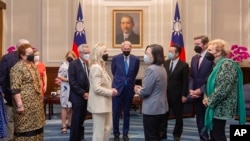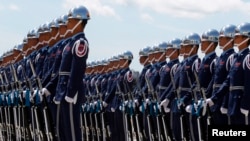A spike in tensions between China and the United States over Taiwan has not gone unnoticed in Africa and has prompted responses that underscore the continent’s tilt toward Beijing.
The U.S. announced trade talks with Taiwan on Thursday following a U.S. congressional delegation’s visit earlier this week that came on the heels of a controversial trip to the self-governing island by U.S. House Speaker Nancy Pelosi. Washington’s recent interactions with Taipei have infuriated Beijing, leading to Chinese military drills in the seas around the island.
Most countries in Africa have sided with China.
During Pelosi’s visit, officials from several African countries condemned the U.S. and publicly supported China. The government of Eritrea deplored Pelosi’s visit as a “reckless” continuation of U.S. policies marked by “flaws and follies.”
Zimbabwe’s ruling Zanu-PF party also attacked the U.S. for “aggressive conduct” following Pelosi’s visit, with spokesman Chris Mutsvangwa saying: “It is cardinal postulate of international diplomacy that there is one China and Taiwan is an integral part of mainland China.”
The foreign minister of the Republic of Congo, meanwhile, expressed firm support for the one-China policy.
Chinese state media were quick to publicize such support from African governments with an article in the China Daily headlined: “Africans see through US ploy in Pelosi visit.”
Another article on CGTN listed all the Africa officials who’d sided with Beijing.
Root of China-Taiwan dispute
The dispute between the People’s Republic of China (PRC) and Taiwan stems from the Chinese civil war in the 1940s when Chiang Kai-shek’s Nationalist government lost to Mao Zedong’s Communists on the Chinese mainland and rebased on the island of Taiwan, also called the Republic of China (ROC).
Beijing considers democratically ruled Taiwan a breakaway province — to be retaken with force if necessary.
In 1979, the U.S. cut diplomatic ties with Taiwan and switched its diplomatic recognition to China. Although the U.S. sells weapons to Taiwan, Washington has formal ties with China, not Taiwan, which is why the visit by Pelosi, a high-level U.S. lawmaker, caused a political storm in Beijing.
For most of the 1960s, Taiwan was more influential than China in Africa, but that changed in 1971 when the U.N. General Assembly affirmed China’s place on the body and denied Taiwan a role — with a majority of African states voting with China.
Since President Xi Jinping’s global infrastructure project, the Belt and Road Initiative, came to Africa along with Chinese loans and investments, more countries have switched ties to Beijing, with Burkina Faso — the second-to-last supporter of Taiwan on the continent — choosing to sever ties with Taipei in 2018.
“Gradually, recognition of Taipei over the last two decades has eroded away,” Alex Vines, head of the Africa program at think tank Chatham House, told VOA. “There are no signs of African countries switching back to Taiwan. Years ago, there was some flip flopping — no sign of that these days.”
In the latest spat between China and the U.S. over Taiwan, most African nations stand firmly with Beijing, loathe to alienate the world’s second-largest economy and Africa's largest trade partner.
Somalia, which has its own problems with the breakaway region of Somaliland, was one of the countries that came out strongly on China’s side during Pelosi’s visit.
Outliers supporting Taiwan
The two outliers on the African continent that continue to support Taiwan are the also-unrecognized Somaliland and Eswatini.
The autonomous area of Somaliland in the Horn of Africa is internationally considered part of Somalia despite having unilaterally declared independence in 1991.
It is clear why Somaliland has chosen to side with Taiwan, said Cobus van Staden, senior China-Africa researcher at the South African Institute for International Affairs.
“It’s a direct play into U.S.-China geopolitics … in order to move a separatist cause forward,” he said.
The only recognized state that now supports Taiwan in Africa is Eswatini, an autocratic absolute monarchy formerly known as Swaziland that borders South Africa.
Contacted by VOA about the kingdom’s continued support for Taiwan, Percy Simelane, director of communications for the office of King Mswati III, wrote: “Our diplomatic relations with Taiwan are our sovereign choice and are based on national interest. To us might and wrath can never be larger than our national interest. We refuse to be part of any continental capture.”
Asked to comment on Pelosi’s Taiwan visit specifically, he demurred, saying Eswatini did not wish to be mistaken for “political referees.”
“We elect to play our cards closer to the chest on Nancy Pelosi's visit to Taiwan lest we are mistaken for what we are not,” he said.
Chatham House’s Vines said Eswatini has long benefitted economically from its loyalty to Taipei.
“King Mswati III clearly believes that Taiwan will reward Eswatini more handsomely than Beijing and make few if any demands in return,” he said.
Sanele Sibiya, an economics lecturer at the University of Eswatini, echoed this, saying Taiwan provides a huge amount of aid to the kingdom — including funds for hospitals and educational scholarships —and, unlike Chinese loans, does not ask for anything to be paid back.
Meanwhile, despite Taiwan being a democracy, it is essentially propping up an increasingly unpopular regime. Large pro-democracy protests broke out in Eswatini last year.
“Taiwan has not said much when it comes to the democratization of Eswatini, because they cannot afford to eliminate Eswatini right now,” said Sibiya.
In terms of China punishing Eswatini for its allegiance, Sibiya said there’s a belief in Eswatini that Taiwan would always “pick up the slack.” And anyway, he said, neighboring South Africa is by far the country’s most important trade partner.
However, as a lot of the diplomatic ties hang on the personal relationship between the king and the Taiwanese government, “in a post-king moment Eswatini may well switch,” van Staden told VOA.







